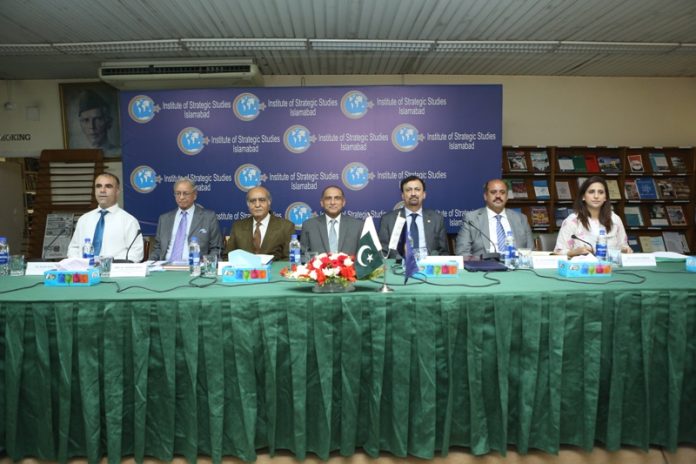Book Launch
on
“Nuclear Deterrence in South Asia – New Technologies and
Challenges to Sustainable Peace”
September 18, 2019
The Institute of Strategic Studies Islamabad (ISSI) hosted launch of the book titled, Nuclear Deterrence in South Asia – New Technologies and Challenges to Sustainable Peace, today. The book has been authored by Dr. Rizwana Abbasi, Associate Professor, Department of International Relations, NUML and Dr. Zafar Khan, Assistant Professor, Department of Strategic Studies, NDU. Commentators for the book included: Ambassador Ali Sarwar Naqvi, Executive Director, Center for International Strategic Studies(CISS); Mr. Khalid Banuri, former Director General, Arms Control and Disarmament (ACDA), SPD; and Dr. Zafar Nawaz Jaspal, Professor, School of Politics and International Relations (SPIR), QAU. Theevent was attended by foreign diplomats, scholars, journalists and students.
Introducing the book, Dr. Rizwana Abbasi and Dr. Zafar said that security dynamics of India and Pakistan are interlinked. Based on emerging and futuristic perspective, she said that the book is, in essence, rational and considers the strategic dimensions of South Asia in the light of India’s massive buildup of both conventional and non-conventional arms.
AmbassadorAli Sarwar Naqvi complimented the book as a symbol of evolving strategic thought on the matters of nuclear deterrence particularly in South Asia. He said that the subject of nuclear deterrence has stimulated scholarly writings inside and outside Pakistan. It seems that nuclear deterrence has been replaced by development and economy, but today the emerging dynamics in patterns and postures of nuclear deterrence in South Asia are hard to overlook. Evolving postures, modern technologies and US-China rivalry has increased the security dilemma especially in South Asia. The authors, Mr. Naqvi commented, have detailed this chain reaction and the precarious implications.
Mr. Khalid Banuri, appreciated the authors’ intellectual input which comes with a refreshing element of objectivity and neutrality while navigating the complexities of security dilemmas. It’s all about the security dilemma that would easily lead to arms race. Mr. Banuri complimented the authors for having contextualized this debate very well by picking the cases of dyads and analyzing their impact on new technologies and state-to-state relations. He said that the book enhances our understanding on the modern evolving patterns and themes of nuclear deterrence.
In his comments, Dr. Zafar Nawaz Jaspal stated that the most commendable part of the book is that it is not a mere historical narrative. The authors, he said, have shed light on how the focus of strategic stability and nuclear deterrence is shifting from Europe to South Asia. He explained how authors made a case for “Thucydides Trap” which does not seem inevitable for Washington and Beijing any more. The authors have ably highlighted the evolving patterns of strategic stability and their implications affecting security matrix of South Asia.
Earlier, in his welcome remarks, Ambassador Aizaz Ahmed Chaudhry said that the book is timely because tensions in South Asia are high after India’s termination of the autonomous status of IOK. Moreover, Indian Defence Minister Rajnath Singh on August 16 has issued a threat over India’s No First Use (NFU) policy, whereby he said that India has adhered to the NFU so far, but what happens in the future depends on the circumstances. This seems like a signal threatening Pakistan with first use of nuclear weapons. He said that the core argument of the book is that the evolving technologies and competing strategies in South Asia make peace fragile and war more likely. It appears that India is not only moving towards a doctrine of first use, but there are indications that it is moving towards a doctrine of nuclear pre-emption as well, he said.
Ambassador Khalid Mahmood, Chairman BOG ISSI, in his concluding remarks said that the increase in crises between the two South Asia nuclear rivals bodes ill for the region and even small conventional crises have the potential to escalate into a nuclear exchange. We must therefore try to mitigate crises and conflict between India and Pakistan and, most important of all, we must find a solution to the Kashmir issue that makes this region conflict prone.












